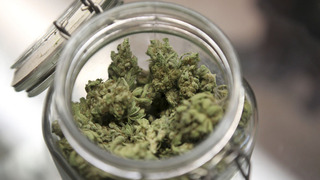
Related
Guests
- Martin Leelongtime investigative reporter and author of several books, including the newly published Smoke Signals: A Social History of Marijuana — Medical, Recreational, and Scientific and Acid Dreams: The Complete Social History of LSD — The CIA, the Sixties, and Beyond.
We turn now to look at the outcome of this month’s historic votes in Colorado and Washington state to legalize the recreational use of marijuana. Even before this, 18 states and the District of Columbia allowed the medical use of marijuana. Now, many are asking whether the passage of these latest measures could be the beginning of the end for marijuana prohibition. All of this comes as the federal government continues to consider marijuana an illegal drug, and the Obama administration has supported police crackdowns even on medical marijuana. Meanwhile, it has ignored studies that show the plant can be effective in treating everything from depression to cancerous tumors. For more, we are joined by Martin Lee, a longtime investigative reporter and author of several books. His most recent is “Smoke Signals: A Social History of Marijuana — Medical, Recreational, and Scientific.” [includes rush transcript]
Transcript
JUAN GONZÁLEZ: We turn now to the look at the outcome of the historic votes in Colorado and Washington state to legalize the recreational use of marijuana. Even before this, 18 states and the District of Columbia allowed the medical use of marijuana. Now, many are asking whether the passage of these latest measures could be the beginning of the end for marijuana prohibition.
All of this comes as the federal government continues to consider marijuana an illegal drug, and the Obama administration has supported police crackdowns even on medical marijuana. Meanwhile, it has ignored studies that show the plant can be useful in treating everything from depression to cancerous tumors.
AMY GOODMAN: For more on what will happen now that Colorado and Washington have made history by legalizing marijuana for adult use, we’re joined by Martin Lee, longtime investigative reporter and author of several books, his most recent, the newly published Smoke Signals: A Social History of Marijuana—Medical, Recreational, and Scientific, and also wrote Acid Dreams: The Complete Social History of LSD: The CIA, the Sixties, and Beyond.
Martin, thanks so much for being with us. He’s co-founder of FAIR, the national media watch group. In these last few minutes of the show—and then we’ll do part two right after the show—talk about the significance of what is happening in Colorado and Washington. Washington state, next Thursday, the law will go into effect.
MARTIN LEE: Well, the take-home message from the votes is significant. America woke up after the elections and looked itself in the mirror and realized two states had voted to legalize marijuana for adult use.
But there’s caveats in the proposition, the ballot measure that passed in Washington state, in particular, that are quite troubling. And it has to do with driving under the influence of drugs. There are stipulations in the ballot measure that’s passed that state that a person who has over a certain amount of metabolites, marijuana metabolites, in their body, can be charged with driving under the influence of drugs. The problem here is that the metabolites for marijuana can stay in the body for many weeks after one uses it. One can take a few puffs of a marijuana cigarette four to six weeks ago, and it’ll still turn up in a drug driving test. So I don’t know how this will hold up in a court of law. The science is very clear on this. The fact that metabolites are in the body is not an indication necessarily of one driving—has been driving impaired.
What’s most troubling of all, however, is for people under 21, drivers under 21 in the state of Washington, there’s a zero tolerance for any indication of marijuana use, so that if a person is pulled over, a 17-year-old driver, and is given a drug test and is found to have marijuana metabolites in their body, they can lose their license, and they could be severely penalized for having any level of the metabolites in their system. And the reason why that’s so troubling is because there’s been a long history of racist law enforcement patterns with respect to marijuana, not only in Washington state, but throughout the United States. And there’s really nothing in the law that would prevent the selective targeting of—particularly for black and Latino youth, for continuing for arrest and harassment by law enforcement. In fact, if anything, the new law might encourage that. And other—officials from other states are already saying that Washington may be a model for the law they’d like to see in their states for marijuana to be legalized. So this is troubling. If the past is any prologue for the future, there’s no reason to be—feel confident that these racist law enforcement patterns won’t continue. And that’s not to say that definitely will continue; it remains to be seen.
What we saw in California in 1996 after Californians passed a law legalizing medical marijuana, that law enforcement was essentially given a free hand to basically respond to Proposition 215 in the way they saw fit from county to county. So in certain areas, like San Francisco or Sacramento or—and particularly Santa Cruz, Oakland, they had more lenient policies. Law enforcement took a hands-off attitude. But in other counties, particularly in what we call “red state California,” the rural counties, the law enforcement were very vicious with respect to medical marijuana usage after 19—after 215 was passed.
AMY GOODMAN: Martin Lee, we want to thank you very much for being with us—we’re going to do part two online at democracynow.org—author of Smoke Signals. This is Democracy Now!, democracynow.org, The War and Peace Report. I’m Amy Goodman, with Juan González.












Media Options